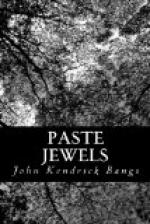“Oh, I wouldn’t,” said Perkins; “let it go; she means well, and when we got her we didn’t suspect she’d turn out such a jewel. She’s merely approaching her norm, that is all. We ought to be thankful to have had such perfection for one year. It’s too bad it couldn’t continue; but what perfection does?”
Nothing, therefore, was said, and Jane smiled on, yet waited most acceptably and kept all things decently and in order—for a little while. Along about Christmas-time a further decadence and additional flaw in the jewel was discovered, and it was Perkins himself who discovered it. It happened one day while he was at work alone in the house, Mrs. Perkins having gone out shopping. A friend from Boston appeared—a friend interested in bric-a-brac and china generally. Thaddeus, to whom a luncheon in solitary grandeur was little short of abomination, invited his Boston friend to stay and share pot-luck with him, knowing, hypocrite that he was, that pot-luck did not mean pot-luck at all, but a course luncheon which many men would have found all-sufficient at dinner. The Boston friend accepted, and the luncheon was served by Jane. In the course of the repast the visitor observed:
“Pretty good china you have, Perkins.”
“Yes,” returned Thaddeus, “pretty good. I’ve always had a penchant for china. My mother-in-law thinks I’m extravagant, and sometimes I think she is right. You never saw my Capodimonte coffees, did you?”
“No,” replied the Bostonian, “I never did. Where’d you get ’em?”
“London,” replied Perkins, “last time I was over. You must see them, by all means. Ah, Jane, hand Mr. Bunkerrill one of the Capodimonte coffees.”
“Wan o’ the what, sorr?” asked the treasure.
Thaddeus blushed. To have his jewel go back on him at such a crisis was excessively annoying. “One of those gold after-dinner coffee-cups—one of the little ones, with the flowery raised figures,” he said, sharply.
“Oh!” said Jane, “wan o’ thim with somebody else’s initial on the bottom?”
“Yes,” said Thaddeus, fuming inwardly.
“Quite a connoisseur, that woman,” laughed the visitor, as Jane went after the dinner-cup. “She’s observed the china mark. She know’s N doesn’t stand for Perkins.”
Thaddeus laughed weakly. “She probably thinks we got them second-hand,” he said.
“Very likely you did,” retorted the Bostonian, and Jane returned with the desired cup. “An admirable specimen,” continued the connoisseur; and them, turning the cup bottom upwards in search of the mark, he disclosed to his own and Thaddeus’s astonished gaze no less an object than the remains of a mashed green pea, a reminiscence of the last Perkins dinner, and conclusive evidence that at times Jane was not as careful in the washing of her china as she might have been.




